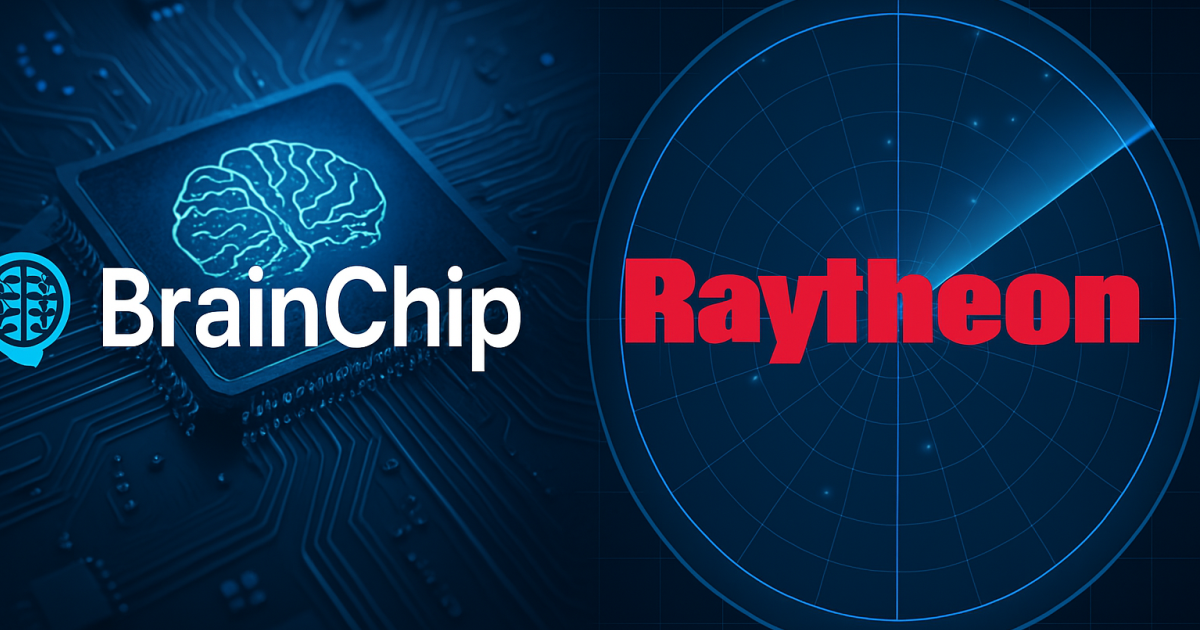
Air Force Research Lab, Raytheon and BrainChip to Bring AIoT to Radar
BrainChip is partnering with Raytheon to service a contract for $1.8M from the Air Force Research Laboratory on neuromorphic radar signaling processing.

The Small Business Innovation Research (SBIR) contract is a development effort expansion after a successful demonstration of radar processing algorithms running on BrainChip’s Akida™ commercial off-the-shelf (COTS) neuromorphic hardware. The signal processing algorithms encompass the processing of RF signals to decode communication and radar waveforms from raw in-phase and quadrature data.(Source: BUSINESS WIRE)
Air Force Research Lab, Raytheon and BrainChip to Bring AIoT to Radar
BrainChip is partnering with Raytheon to service a contract for $1.8M from the Air Force Research Laboratory on neuromorphic radar signaling processing.www.iotevolutionworld.com
You are aware this is from beginning April, right?The Small Business Innovation Research (SBIR) contract is a development effort expansion after a successful demonstration of radar processing algorithms running on BrainChip’s Akida™ commercial off-the-shelf (COTS) neuromorphic hardware. The signal processing algorithms encompass the processing of RF signals to decode communication and radar waveforms from raw in-phase and quadrature data.(Source: BUSINESS WIRE)
The date is on the article, you are aware of that as I am, do you have a problem with that ?You are aware this is from beginning April, right?
What's the point of posting 5 months old news, huh?The date is on the article, you are aware of that as I am, do you have a problem with that ?
Doesn’t he always have a problem withThe date is on the article, you are aware of that as I am, do you have a problem with that ?
Hi cosors,Just a snippet from Sweden (my usual TLG walk)
"...
Saab develops new unmanned underwater vehicle for FMV
...
The aim of the FMV-led project is to develop a concept for a larger unmanned underwater vehicle, a so-called Large Uncrewed Undersea Vehicle (LUUV). The company is the main supplier for the LUUV and will be responsible for the design, construction and testing of the vehicle.
Part of the ship system will be Saab's autonomous control system "Autonomous Ocean Core", which gives ships autonomous capabilities on and under the water surface.
..."

Saab utvecklar ny obemannad undervattensfarkost åt FMV
Saab har tecknat kontrakt med Försvarets materielverk (FMV) för ett utvecklingsprojekt för en större undervattensfarkost. Ordervärdet uppgår till SEK 60 miljoner. Målet med projektet, som leds av FMV, är att ta fram ett koncept för en större obemannad undervattensfarkost, en så kallad Large...www.industrinyheter.se
Being an island, we need a lot of these.Hi cosors,
The Australian version is the Ghost Shark:
https://en.wikipedia.org/wiki/Ghost_Shark_(submarine)
The Ghost Shark (also known as Ghost Shark XL-AUV) is an extra large autonomous underwater vehicle being jointly developed by Anduril Industries and the Australian Department of Defence (DoD) for the Royal Australian Navy (RAN). Three submarines have been ordered for the Royal Australian Navy and one for the United States Navy. The first of the submarines was publicly revealed in April 2024.
"Hey Mercedes"
MBUX Voice Assistant
Talk to your Mercedes-Benz and get to know your vehicle as you've never experienced it before. The MBUX voice assistant listens to what you say. Without having to learn commands beforehand. This Digital Extra is already installed in your Mercedes-Benz before you start the engine for the first time. All you need to do is activate the MBUX voice assistant in your vehicle or through your service management. Your vehicle reads text messages out loud, checks the weather at your destination, finds the fastest route or the perfect radio station - "Hey Mercedes" is all it takes.
Activate now
IMO ..... the Use of the words "THIS DIGITAL EXTRA ........" is most interesting and set's car level options for drivers with 3 year Lic's for same.Unfortunately the lack of automotive certification required for use in production vehicles, combined with Mercedes’ strong Qualcomm integration, makes it unlikely that Akida is already installed in series production in 2025. For future generations (e.g., highly automated driving, energy-optimized on-board AI) it is more likely. So far, there is no official information regarding such certification.
Even apart from the tech details, I think this whole subscription model for ‘digital extras’ feels like a rip-off. You already pay a huge amount for the car itself, especially when fully equipped, and then they still want to charge you extra for features that are physically in the car anyway.IMO ..... the Use of the words "THIS DIGITAL EXTRA ........" is most interesting and set's car level options for drivers with 3 year Lic's for same.
Yogi, if your on this forum, you're an idiot. How embarrassing... Stupid moron.Brainchip Post

#brainchip #akida #risc #andes #edgeai #neuromorphiccomputing #aiinnovation | BrainChip
BrainChip was proud to join Andes RISC-V CON Beijing last week to connect with industry leaders and showcase our Akida™ AKD1500 on the Andes QiLai Voyager Board. BrainChip’s Jerry Kuo also joined the panel “Accelerating AI Computing: Strengths and Challenges of RISC-V” to share insights on the...www.linkedin.com
Yogi, if your on this forum, you're an idiot. How embarrassing... Stupid moron.

ee* Was it Tapson in the Roadmap video who mentioned that his suggestion, which was warmly received by the military, that a rearward facing helmet camera would enable soldiers to view hand signals from their fellow soldiers who were behind them?What We Know So Far About Anduril's 'Eagle Eye' Military XR Headset and Founder's Reunion With Meta https://share.google/a4nAPPbGZU3q9A4UW
Yogi, if your on this forum, you're an idiot. How embarrassing... Stupid moron.
